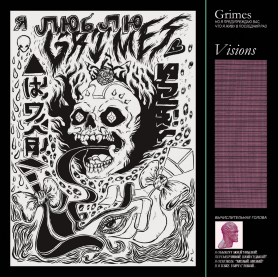Print Edition: February 22, 2012
 Often, writing about music can seem horribly inept. How can words express music, which is often remarkable for its abstractness and for its inability to be pinned down? Perhaps the greatest case of this is Grimes, whose music sheds judgments of genre at every turn, and inquires after the use of words and, more often than not, rejects them, defying description. Grimes might seem to be related to some form or combination of electronic and pop music, but Claire Boucher, the voice(s), writer, composer and producer behind the name, has a unique soundscape comprised of endlessly layered vocals that eschews pop music’s most inherent tradition: lyrics. That’s not to say there aren’t any in Visions or any of Grimes’ three previous albums, but in all cases they alternate between personal and obscured. They might be clear for a moment, but the longer they go on the more likely they become overcome by music and become music. Boucher sees no line dividing vocal performance and the electronic sounds and programs that are composing instruments for Grimes. And so, on tracks like “Circumambient” (which as clearly as anywhere in Boucher’s lyrics presents one of the main questions that recurs throughout Grimes’ discography, beginning “Oh baby / I can’t say”) which opens under the guise of a potential radio-friendly dance hit, only to explode into four, five, six voices all contending, merging, saying nothing with words but everything in feeling, slipping in and out and becoming one with the beats that don’t drive so much as provide a floor for Boucher’s vocals, the real music, though it is sung, is made wordlessly, not in a purely instrumental vein, but in the transportive confusion of Grimes’ sound.
Often, writing about music can seem horribly inept. How can words express music, which is often remarkable for its abstractness and for its inability to be pinned down? Perhaps the greatest case of this is Grimes, whose music sheds judgments of genre at every turn, and inquires after the use of words and, more often than not, rejects them, defying description. Grimes might seem to be related to some form or combination of electronic and pop music, but Claire Boucher, the voice(s), writer, composer and producer behind the name, has a unique soundscape comprised of endlessly layered vocals that eschews pop music’s most inherent tradition: lyrics. That’s not to say there aren’t any in Visions or any of Grimes’ three previous albums, but in all cases they alternate between personal and obscured. They might be clear for a moment, but the longer they go on the more likely they become overcome by music and become music. Boucher sees no line dividing vocal performance and the electronic sounds and programs that are composing instruments for Grimes. And so, on tracks like “Circumambient” (which as clearly as anywhere in Boucher’s lyrics presents one of the main questions that recurs throughout Grimes’ discography, beginning “Oh baby / I can’t say”) which opens under the guise of a potential radio-friendly dance hit, only to explode into four, five, six voices all contending, merging, saying nothing with words but everything in feeling, slipping in and out and becoming one with the beats that don’t drive so much as provide a floor for Boucher’s vocals, the real music, though it is sung, is made wordlessly, not in a purely instrumental vein, but in the transportive confusion of Grimes’ sound.
Other ideas emerge slowly over the course of Visions in the question of identity (“Be a Body”) and a fascination with what lies outside of our knowledge of the universe (“Colour of Moonlight“), but more than heady themes stated by fading lyrics the enveloping chorus of Boucher’s compositions enters the mind. Grimes’ music exists in a perfect state of mind that constantly allows for interpretation yet guides enough that Boucher’s sensibility is always evident. The unsustainably ecstatic “Eight,” the tonal shift in “Symphonia IX” (perhaps the closest Visions gets to Grimes’ earlier work), the whispering skepticism of “Oblivion,” – it all adds up to another triumph of musical evolution for Boucher. Despite Boucher’s recordings coming out in quick succession, just as Halfaxa was considerably changed from Geidi Primes and Darkbloom had something new in every track, so too does Visions signify a shift. Grimes appears to have moved closest to more accepted forms of song structure with this latest album (there’s nothing near as avant-garde as some of the recordings on Halfaxa) yet the sound is clearly, unmistakably that of Boucher’s, more significant for its own properties than the ones it rejects.
If nothing else leaves an impression in Visions, then the song Boucher chooses to close the album with certainly does. For someone so proficient at unconventionality, Boucher is remarkably adept at crafting a song traditional in form with verses of lyrics. “Skin” is an eye-opener, coming at the end of what has been an eye-opening opening of an artistic career. It still deviates from pop expectations—it’s six minutes long and perhaps most memorable for the breaths and beats between lines—but it follows the tradition of standout songs in Grimes’ discography, “My Sister Says the Saddest Things” and “Vanessa” being the precursors, that both exist as endlessly replayable on their own, and emblematic of the work surrounding them when taken in concert. The most striking thing about Grimes’ music is this: “Skin” is a six minute song, yet what is a six minute song when it neither flies by nor drags, when it seems to compress and dilate time into an inexplicably evocative and otherworldly experience? Visions is both mechanically and naturally breathtaking, and Grimes might be the best thing happening in Canadian music right now.


